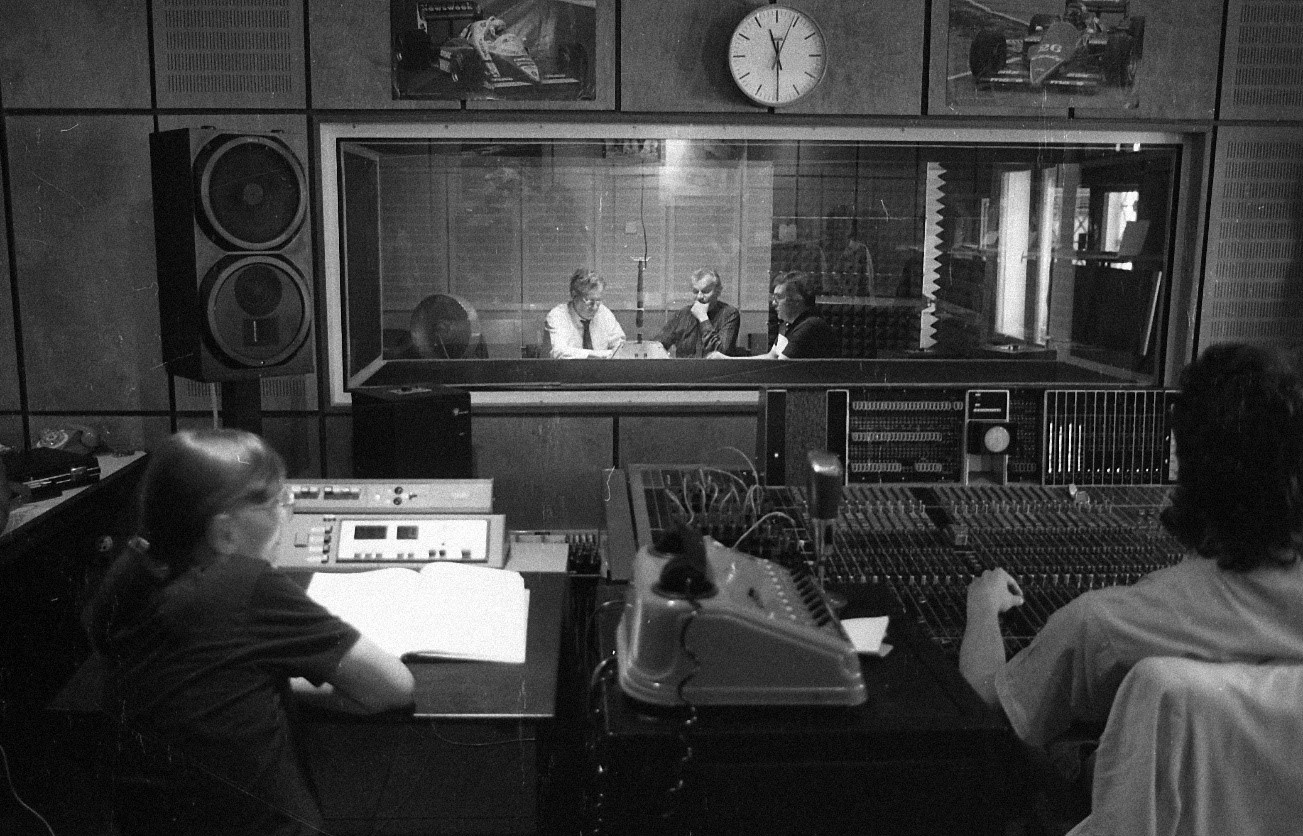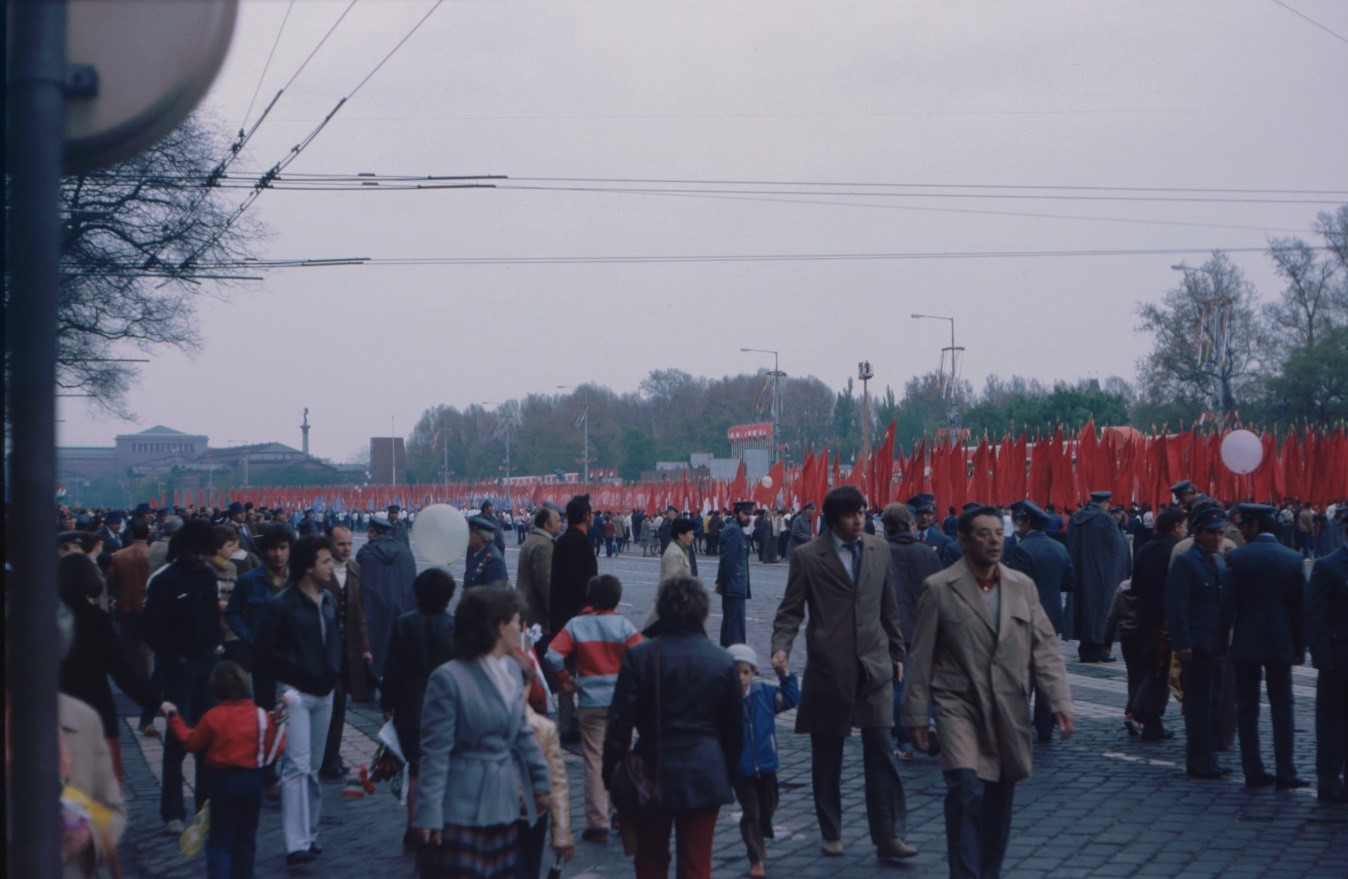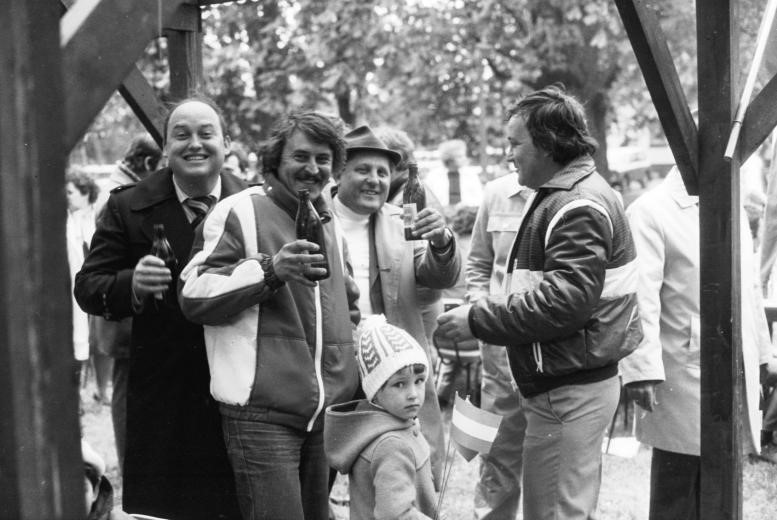'An Englishwoman's Life in Communist Hungary': Chapter 3, Part 13.
- 27 Feb 2023 1:42 PM

Now You See It, Now You Don’t and House of Cards have been included as part of the Open Society Archive dedicated to this period in the CEU. You can read a serialisation of them here on Xpatloop. You can also buy the dual-volume book on Kindle as well as in Stanfords London.
Chapter three: Market and May Day: Garay tér
Part 13 – Recording work; last days in the Garay tér flat
Christmas came and went, and 1984 began with a week spent in Orosháza. Lingua was doing well with an abundance of new courses and new students. They had expanded into two more rooms on the same floor of the building and bought much new equipment.
Orosháza was my favourite country course. Lessons were held and teachers accommodated at the glass factory's guesthouse on a lakeside. It was a large, single-storey building, predominantly made of glass, with long lawns sloping down to the water's edge. Each day's lessons ended with some kind of party, or an evening spent at the home of one of the students.
Through us they learnt to love both a language and its culture, and with them we formed special friendships that lasted many years beyond the lessons. One memorable Saturday separating the two weeks of a course, we decided we would all go to the champagne-bottling plant at Kecskemét whose bottles were made in Orosháza.
János, Miklós and Paul were all there so, with about a dozen students we set off in convoy for Kecskemét.
We were met by our students' counterparts and taken for champagne tasting. Six long, slim glasses containing different varieties of champagne were poured for each of us. After three glasses I, for one, had ceased to notice anything but the increasing effect, the taste fast becoming of secondary consideration.
We were then presented with an unopened bottle of the one we liked best and led down into a cool, dark cellar furnished with long wooden tables laden with cold food. My memory of events became hazy from that point on, and it was only late Sunday morning that I found out whose car I had come back in, and that I had slept throughout the journey.
The succeeding months' work was all in Budapest, and I returned to regular cello lessons and teaching.
With no telephone either here or the previous flat our evenings were unpredictable: we could be alone at six and with several friends by seven, since communication necessitated seeing one another personally, and anyone could call in at any time.
It was in February 1984, after eighteen months, that we met the first English person living in Budapest.
Caroline had in fact come to Hungary in 1967, married her artist penfriend, had three sons, and was now living in a village on the city boundary. She was able to tell us of about half a dozen other British people also resident in Budapest, all of whom had married Hungarians.
We had thus far deliberately not sought out English people, not wanting to be drawn into some kind of expatriates' circle, but none in fact existed. Caroline was a fount of information on any subject we touched upon, and a week later she left a message in our letterbox asking if we would like to do a voice recording at a film studio with her.

Hungarian Radio studio Courtesy Fortepan/ Magyar Rendőr
It was the first time I had undertaken such work and my first task was for a film about teaching very young children the Kodály method of singing.
Later recordings varied from language-teaching cassettes (English-made cassettes being unavailable), and voice-overs for documentary films about Hungary.
The translation of the original Hungarian text was poor and the first hour had to be spent correcting it, the many scribbled alterations rendering the text all but illegible so that we made many errors in our reading. But it was a new experience, and many similar ones were to follow, always in a relaxed atmosphere of patient technicians and long coffee breaks necessitated by faulty equipment or missing pages of script.
May 1st was sunny, and because I had missed the previous May Day celebrations, I was determined to go.
The scale of the event was unmatched by anything else in the year. For weeks before, a loudspeaker system was set up along the entire length of Dózsa György út and in the City Park. Red banners proclaimed the Hungarians' thanks to their brothers in the Soviet Union and the ever-strengthening crusade towards Communism. It was a fineable offence not to hang the Hungarian and Red flags outside every building in the country.
In every factory and office block employees were 'volunteered' to march as representatives of their place of work. On the day itself groups of people would begin to gather in every side street off Dózsa György út as early as six o’clock, banners, balloons and beer in hand.
Their numbers swelled to tens of thousands by ten o’ clock, the official start of the procession. Then the tribune next to the statue of Lenin would fill with the leaders of the Party, and socialist workers' songs would boom out through every speaker.
On the live television broadcast, a homogeneous mass of banner-waving people could be seen singing as they marched the length of Dózsa György út for two hours or so, while the voice over the speakers called, ‘Long live the Red Star shoe factory of…; Long live the Socialist Brotherhood Cooperative farm of…’.
I walked out of the house into Garay tér and was swept along with the crowd; it would have been impossible either to stop or turn back. I found myself marching with the Union of Ship Workers. Many had brought their children, hoisted up on their shoulders, waving balloons.
I looked around me. No-one was singing. All the cheering, all the singing, was coming from the grey speakers on every tree and lamppost. The marchers were struggling against the noise to carry on conversations with husband, wife, child or friend.

May 1st parade, Dózsa György út
‘Pisti, pass me the beer!’ shouted one, and a bottle was duly passed, swigged from and returned.
‘Where are we meeting Ági and Éva?’ a woman shouted.
‘By the fountain in the park - they've got the food,’ came her friend's reply.
As we thronged past the tribune few cast more than a glance at their leaders, they just walked past as they might have done to a football match, smoking, chatting, glad to have a day off work and to be out in the sunshine. Free beer was provided in the park near Heroes' Square, where groups of friends and colleagues sprawled on the grass, and many fell asleep from the combined effects of sunshine and alcohol.

It must have been some time towards the end of June that Rózsi-néni came to collect the rent, saying that Zoli-bácsi was still ill. Her daughter and family were again expected in August and we told her we would also be travelling to England and returning at the beginning of September. It was in fact a relief to escape from the relentless sunshine and temperatures well into the thirties.
We completed the usual round of visits to family and friends, including Sue and Steve with their new baby.
The first two weeks were a blissful rest from the endless stream of exhausting challenges which constituted everyday life in Budapest. But then came the restlessness we had experienced the previous year, and we started to count the days until our return.
A few days after arriving back in Budapest, Rózsi-néni appeared. ‘How's Zoli-bácsi?’ we asked.
‘No better,’ she said, shaking her head. We invited her to sit down, gave her the rent and offered her some tea. ‘My daughter's coming back from Canada,’ she suddenly announced. ‘She didn't pass her medical exams and she doesn't want to stay there if she can't work.’ We were amazed, after all that Endre had told us.
‘When are they coming back?’ I asked.
‘By Christmas. But they don't want to live here in Garay tér,’ she continued. ‘They want me to find them a new flat.’ She had stood up and was making her way towards the front door. ‘You like it here though, don't you?’ she said, looking around. We nodded. ‘This flat's been in the family for a long time. Oh well, after Canada I suppose…’ she tailed off, opening the door.
We were stunned. For us, this would be the worst time to move, just when term was starting. We would hardly have time to go flat-hunting. And we had no idea how much time we would have if the flat had to be swapped before Christmas.
When we told Endre, he maintained that there was absolutely no chance of Anna and her family returning from Canada.
What he could imagine was that the husband's permit was not going to be extended by the Hungarian state, and that they were now in the position of having to return or stay in Canada illegally, in other words, defect.
If they chose to stay, the Garay tér flat, which was in Anna's name, but was of course a state flat, would automatically be confiscated.
The only way to preclude this would be to swap the flat, not with another state flat - as Péter and Éva had done - but with a privately-owned flat. A private flat was worth twice as much as a state one, so that someone wanting to live in a much larger flat could swap their small private one with someone like Rózsi-néni who had a large state one.
Endre concluded that this was what was happening. Rózsi-néni would find a small private flat and swap it for Garay tér. Having done this, she could quite legally sell the new flat and thus nothing would be lost if her daughter decided to stay in Canada. If, however, the authorities suspected what was going on, they would intervene.
Click here for earlier extracts
Main photo: Orosháza (Gyópárosfurdő) Courtesy Fortepan/ Lechner Nonprofit Kft. Dokumentációs Központ






























LATEST NEWS IN community & culture